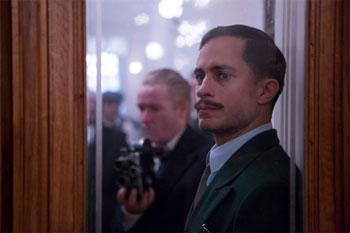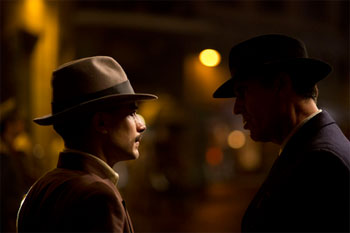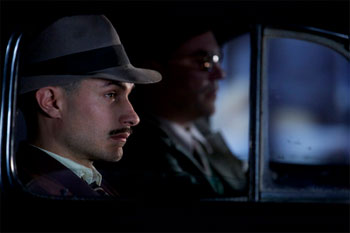Gael García Bernal Neruda Interview

Neruda
Cast: Gael García Bernal, Luis Gnecco, Mercedes Morán
Director: Pablo Larraín
Rated: MA
Running Time: 108 minutes
Synopsis: A glorious mix of history and imagination, Neruda is the enthralling new film from multi awardwinning director Pablo Larraín (No, Jackie), a lavishly mounted and grandly entertaining depiction of the manhunt for exiled Chilean poet and politician Pablo Neruda.
It's 1948, and the Cold War has reached Chile. Following the President's outlawing of communism, Neruda (played by Luis Gnecco, bearing a remarkable likeness) and his artist wife Delia (Mercedes Morán) are forced into hiding. Beloved by the populace, they slip underground and are pursued by incompetent, vainglorious police inspector Oscar Peluchonneau (the superb Gael Garcia Bernal), hoping to make a name for himself by capturing the country's most infamous fugitive.
Whilst life on the run holds little charm for the cultured and hedonistic Neruda, he uses the opportunity to reinvent his work and life, leaving clues for his pursuer designed to make their game of cat-and-mouse even more dangerous and thrilling. Thwarting Peluchonneau at every turn, it's almost as if the detective is the man Neruda would have written to chase himself…
Blending visual grandeur and literary wit, Neruda is a beguiling reinvention of the -standard' cinematic biography. Playfully confounding expectations at every turn, the film offers a startling rumination on the split between the person and persona, the man and the artist. Gripping, funny and ingeniously conceived, this is undoubtedly Larrain's finest achievement to date.
Neruda
Release Date: May 25th, 2017
Website: www.neruda.com.au
 Interview with Gael García Bernal
Interview with Gael García Bernal
Question: This is the second time you've worked with Pablo Larraín. What was this new experience like? How did you get involved in Neruda?
Gael García Bernal: The first time was like being parachuted into a very well-formed movie family. Starting with the curiosity and instinct of Pablo Larraín, they all made me feel part of a creative group that needed an 'outsider" to jam with them on No. This time, with Neruda, the family – still cinematic, orgiastic, swarming, and highly professional – came together to make this new carnival inspired by Neruda's works. I only speak of his work, because in the life of a poet of such dimensions, the works are his life's creation. We navigate upon that strange and human ocean. Pablo Larraín is a director who knows most of us really well, and I must add, this is a really likeable and supremely talented group. So often, he watched us take incredible risks on the set and, sometimes, getting totally fed up in the editing rooms. For that reason, and because of the friendships we all formed on and off the set, he came to measure our potential. Thanks to our director's sensitivity and daring, we were able to really delve into this film of epic proportions – trans-Andean, with snowy fields and persecutions – focused on the subtlest and most sublime aspect, the poetry. Without a doubt, there are very few directors with the courage and the talent to dive under the deep snowfall of creation. We always expect it to be cold inside. Pablo Larraín always seems to come up with another dimension of what appeared so impenetrable.
Question: How did you approach this character, the tracker who melds with his prey, who needs his prey as his prey needs him?
Gael García Bernal: Every time out, I'm more certain that when a question is interesting, dangerous and keen, the body is the first to respond. It's from the body – or through characterization, to put it in more professional terms – that Peluchonneau took shape. The desire to be a 'great policemen" though he's a bastard, the film noir character with no past and no future, the policeman who can sleep standing up, the character who is always dressed the same, that character with one eye half closed and who doesn't observe the conventions of 'Hello, how are you?" and customary answers. Together with Pablo Larraín we discussed the character extensively and you could say that this body took on its soul at the moment we decided that the character would be the son of a prostitute. The pariah, or the exile returns, to make a name or identity for himself by measuring himself against a creator of living moments like Neruda.
 What does a policeman do in order to hate a poet? He's fascinated by him. The archetype of the postwar conservative, specifically one who has accepted defeat with profound resentment, with all his insecurities on the surface, was key to finding Peluchonneau's imaginative spark.
What does a policeman do in order to hate a poet? He's fascinated by him. The archetype of the postwar conservative, specifically one who has accepted defeat with profound resentment, with all his insecurities on the surface, was key to finding Peluchonneau's imaginative spark.
Question: How does this film fit with current cinematic trends?
Gael García Bernal: It seems to me there are very few films like this one right now. I'm not referring to making a freestyle biopic inspired by the work of the author-subject. I'm speaking more specifically about the controversial theme that this film addresses – the poetic word. Cinema is a fantastic place for emotion and for its intellectual and narrative consequences. It doesn't depend on the word in order to be what it wants to be. However, this film's starting point is the word, the dangerous word that makes you fall in love and which creates new worlds. The characters are caught up in that whirlwind during the action of the film. They suffer because they can't break free of the constraints of poetic creation. And obviously the poet is the one who reads that language, who can bring it back to earth, by making it at once myth and truth. I can't think of another film like that out there right now, especially not one that manages to navigate those waters and still be as entertaining as Neruda.
Neruda
Release Date: May 25th, 2017
Website: www.neruda.com.au
MORE





